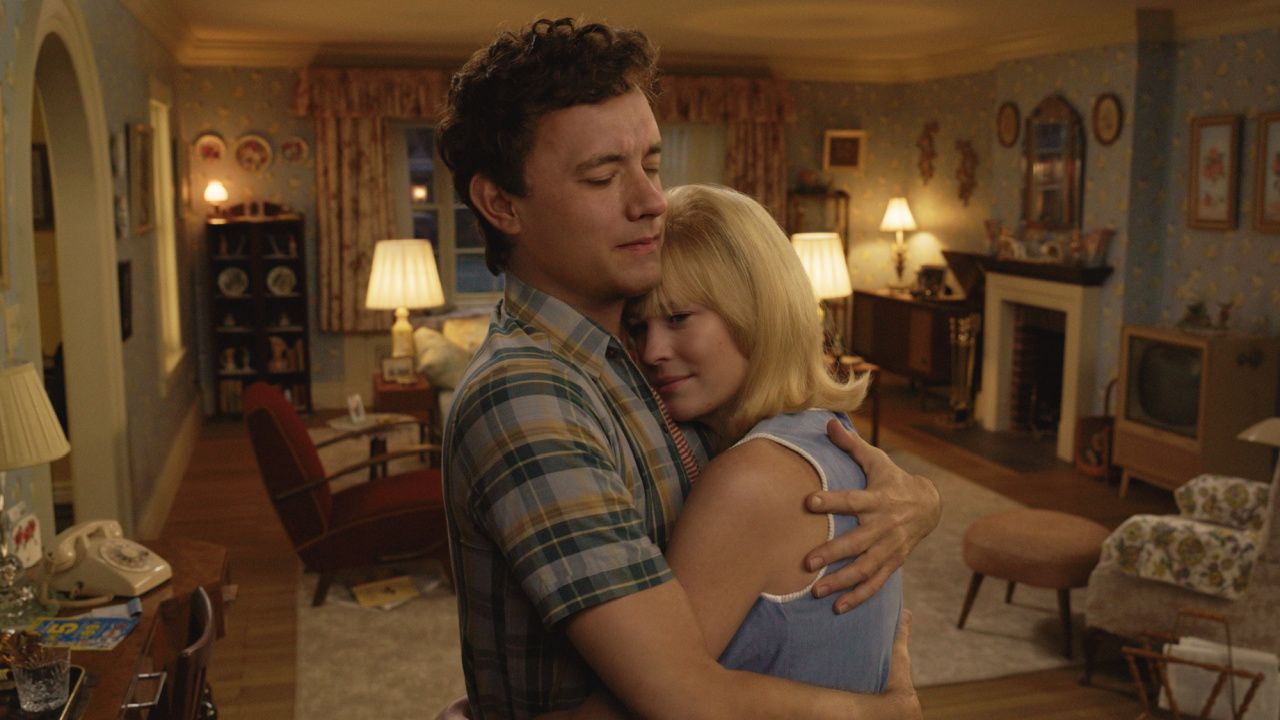‘The Substance’ Takes Body Horror to a Whole New Level and Meaning
Demi Moore gives the performance of her career in ‘The Substance,’ a gruesome horror epic that wickedly skewers our standards of female youth and beauty.

Demi Moore in 'The Substance'. Photo: Mubi.
Opening in theaters September 20 is ‘The Substance,’ directed by Coralie Fargeat and starring Demi Moore, Margaret Qualley, and Dennis Quaid.
Related Article: Dennis Quaid and Penelope Ann Miller Talk 'Reagan' and His Legacy
Initial Thoughts
Coralie Fargeat’s 2017 feature debut, 'Revenge,' was supposed to be a feminist spin on the well-worn rape-revenge horror tropes so common in genre fare – and handled with varying quality -- from 'I Spit on Your Grave' to 'The Nightingale.' But 'Revenge' didn’t so much subvert those tropes as rehash them once again, as if shifting to a female gaze could somehow absolve the film of the film’s still exploitational imagery.
“The Substance” is a different animal altogether. While no one is going to accuse Fargeat’s epic second feature of a light touch or subtlety, this is a feminist body horror tale that utilizes its own tropes to hammer home its point and subvert its own exploitational imagery, telling a story about identity, aging, standards of beauty, and the price of celebrity that is equal parts poignant, hilarious, and utterly gross (in a good way). All of it’s anchored by Demi Moore in what may be her finest performance ever, while Margaret Qualley provides equally superb support – as two sides of the same shattered person.
Story and Direction

'The Substance'. Photo: Mubi.
Moore plays Elisabeth Sparkle, a one-time A-list actor who has settled (or really, been forced) into a second career as the host of a morning fitness TV show, where she shows off her still-fit body every day – until she’s abruptly fired on her 50th birthday by the loathsome head of her network, Harvey (Dennis Quaid), who’s looking for younger flesh. Suffering minor injuries in a car accident on her way home from their meeting, Elisabeth is given a flash drive by a nurse at the ER that leads her to a company which makes a serum called “the Substance.”
According to the company – represented only by an emotionless voice on the phone – the serum will create a beautiful, younger, “perfect” version of its user. The catch is that it’s only viable for seven days before the new version and the original must switch places again for a week. Elisabeth proceeds to order the serum and inject it, leading to a painful process in which the new, younger, “hotter” version of her – named Sue (Margaret Qualley) – is born out of her own back as she slips into her week-long coma.
Sue quickly auditions for and lands Elisabeth’s old job hosting the fitness show, with a lustful Harvey and his fellow execs propelling her to greater heights of fame. As the “real” Elisabeth sinks into depression and jealousy, letting herself go as she mopes around her high-rise apartment during her weeks of being “active,” Sue breaks the rules to extend her use of the serum past the mandated seven-day period – with results that go from disturbing to repulsive to eventually all-out horrifying.

Margaret Qualley in 'The Substance'. Photo: Mubi.
Directed with an increasingly gonzo fervor by Fargeat, who also wrote the deliciously satirical screenplay, ‘The Substance’ plays like a mix of early David Cronenberg and Peter Jackson, wielding the satirical bludgeon of Paul Verhoeven and anchored by the feminist fury of the speech Greta Gerwig wrote for America Ferrera in ‘Barbie.’ The visual effects supervised by Bryan Jones (mostly practical) are grotesque and in-your-face, yet take every miracle drug and body “enhancement” to its extreme conclusion, showing us the dark path that garbage like Ozempic and Botox and endless plastic surgeries lead women down in pursuit of ridiculous, just-out-of-reach standards of beauty.
Unlike ‘Revenge,’ ‘The Substance’ explores objectification but doesn’t get trapped in it. Moore and Qualley are frequently nude or barely dressed, but there’s nothing sexual about the way the film treats them; Qualley in particular, her body tight, blemish-free, and practically glowing, never seems quite real in the glaring eye of the TV cameras that follow Sue incessantly. And even with the gruesome repercussions once Sue deviates from the serum’s required dosages and timespan, in some ways the most disgusting sight of the movie is a close-up of Dennis Quaid’s mouth as he slurps and smacks his way through a plate full of shrimp at lunch while firing Elisabeth.
‘The Substance’ does go on a bit too long at 140 minutes, but Fargeat almost never loses control of the material or tone. The movie becomes just as much of an assault on the senses as the nonstop gamut of sexed-up female bodies constantly thrown at us in commercials, videos, TV series, and movies, but that’s the point: to pummel us into submission and force us to watch the bloody aftermath of the pressure put on women to look, sound, and feel like flawless carnal goddesses whose silky outer shells belie the rot within that’s been thrust upon them.
The Cast

Margaret Qualley in 'The Substance'. Photo: Mubi.
As a middle-aged actress in her early 60s, Demi Moore knows full well what this movie is about and throws herself fearlessly into the role of Elisabeth, creating a complex, shattering, yet witty performance that may simply be the best she’s ever offered. When we first meet her, Elisabeth is not exactly happy but doing her best to navigate the cruel currents of a business that has gradually cast her out. Her desperation drives her to extremes of physical and psychological pain and Moore bares it all (literally and figuratively), her own howls of frustration and anger coming through some of the heaviest makeup during the latter stages of Elisabeth’s decline. This is dig-deep, raw stuff from an actor who was often dismissed as just a pretty face.
Qualley matches Moore beat for beat, playing the darker flipside to Elisabeth as her potential for narcissism and instant gratification gets unwittingly realized via Sue. Qualley – who’s having a damn fine year between her work in this, ‘Kinds of Kindness,’ and the otherwise dreary ‘Drive-Away Dolls’ – gives us fleeting glimpses of Moore’s Elisabeth that flicker across Sue’s porcelain surface like shadows on a bright screen. Sue’s physical perkiness is matched by her seemingly innocent persona, but her manipulative edge reinforces the notion of how Hollywood forces women to act despicably toward themselves and other women just to stay on top.
We have to tip our hat to Quaid as well, who too often spends his time these days in faith-based movies but who portrays (the perhaps intentionally-named) Harvey as the ultimate, lip-smacking, lecherous distillation of every male show biz exec who thinks he’s in control and that whatever fleeting power he has gives him dominion over others, especially women.
Final Thoughts

Demi Moore in 'The Substance'. Photo: Mubi.
As hinted earlier, ‘The Substance’ does not hide its agenda nor its intentions. The movie goes for broke with everything, from the leave-it-all-on-the-field performances to the crazily tilting, spinning camera angles to the sizzling editing and pulsating score (by Raffertie). Its third-act ballet of body horror may turn some queasier viewers off, but that’s kind of the point – what women are forced to do to keep up with the standards imposed on them is a physical corruption that almost certainly has after-effects we don’t even know about yet. ‘The Substance’ manifests that bitter truth in ways that are incisively funny, deeply sad, and profoundly unsettling.
‘The Substance’ receives 8.5 out of 10 stars.
What is the plot of ‘The Substance’?
A former A-list actor (Demi Moore), her career on the decline as she is aged out of the business, takes a mysterious drug that transforms her into a younger, perfected version of herself (Margaret Qualley). But she soon discovers that there are horrifying ramifications if the rules on taking the substance are not followed to the letter.
Who is in the cast of ‘The Substance’?
- Demi Moore as Elizabeth Sparkle
- Margaret Qualley as Sue
- Dennis Quaid as Harvey
- Gore Abrams as Oliver
- Robin Greer as the Nurse
- Tom Morton as the Doctor
- Hugo Diego Garcia as Diego

'The Substance'. Photo: Mubi.
Demi Moore Movies and TV Shows:
- 'Blame It on Rio' (1984)
- 'St. Elmo's Fire' (1985)
- 'About Last Night...' (1986)
- 'One Crazy Summer' (1986)
- 'Wisdom' (1986)
- 'We're No Angels' (1989)
- 'Ghost' (1990)
- 'Nothing but Trouble' (1991)
- 'Mortal Thoughts' (1991)
- 'The Butcher's Wife' (1991)
- 'A Few Good Men' (1992)
- 'Indecent Proposal' (1993)
- 'Disclosure' (1994)
- 'The Scarlet Letter' (1995)
- 'Now and Then' (1995)
- 'The Juror' (1996)
- 'The Hunchback of Notre Dame' (1996)
- 'If These Walls Could Talk' (1996)
- 'G.I. Jane' (1997)
- 'Deconstructing Harry' (1997)
- 'Charlie's Angels: Full Throttle' (2003)
- 'Bobby' (2006)
- 'Mr. Brooks' (2007)
- 'Flawless' (2007)
- 'Bunraku' (2010)
- 'Another Happy Day' (2011)
- 'Margin Call' (2011)
- 'LOL' (2012)
- 'Very Good Girls' (2013)
- 'Forsaken' (2016)
- 'Wild Oats' (2016)
- 'Rough Night' (2017)
- 'Blind' (2017)
- 'FEUD' (2017 - 2024)
- 'Corporate Animals' (2019)
- 'Brave New World' (2020)
- 'Songbird' (2020)
- 'The Unbearable Weight of Massive Talent' (2022)
- 'BRATS' (2024)
Buy Tickets: 'The Substance' Movie Showtimes
Buy Demi Moore Movies on Amazon



































